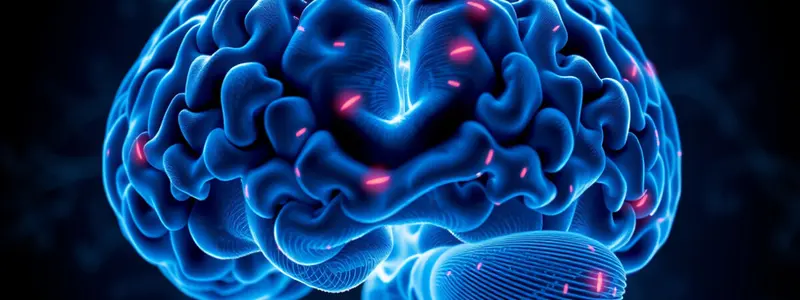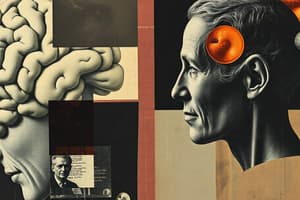Podcast
Questions and Answers
What is the main focus when caring for a client experiencing delirium?
What is the main focus when caring for a client experiencing delirium?
- Encouraging high levels of stimuli to stimulate awareness
- Maintaining their safety and providing reorientation (correct)
- Avoiding interaction to minimize anxiety
- Administering high doses of antipsychotics immediately
Which statement best describes the approach to communication with a delirious client?
Which statement best describes the approach to communication with a delirious client?
- Use a calm and clear voice while maintaining a relaxed demeanor (correct)
- Engage in rapid conversation to keep them alert
- Respond with anxious energy to reflect urgency
- Speak in a loud and authoritative voice to command attention
When might medications be considered for a client with delirium?
When might medications be considered for a client with delirium?
- As a preventative measure before any symptoms arise
- If there is agitation and aggression requiring low-dose antipsychotics (correct)
- When treatment is needed solely to increase their alertness
- To reverse general confusion without regard to symptoms
What setting is recommended for a client experiencing delirium?
What setting is recommended for a client experiencing delirium?
Which medication class is typically used for clients experiencing withdrawal that leads to delirium?
Which medication class is typically used for clients experiencing withdrawal that leads to delirium?
Which of the following is a key feature of delirium?
Which of the following is a key feature of delirium?
Which condition is commonly associated with causing delirium in elderly patients?
Which condition is commonly associated with causing delirium in elderly patients?
What does delirium NOT typically cause?
What does delirium NOT typically cause?
What is a critical factor in the resolution of delirium?
What is a critical factor in the resolution of delirium?
How is delirium distinguished from other neurocognitive disorders?
How is delirium distinguished from other neurocognitive disorders?
Which of the following can be considered a predisposing factor for delirium?
Which of the following can be considered a predisposing factor for delirium?
Which symptom is NOT typically associated with delirium?
Which symptom is NOT typically associated with delirium?
Which of the following symptoms is NOT commonly associated with delirium?
Which of the following symptoms is NOT commonly associated with delirium?
Which of the following is best practice in care for clients with neurocognitive disorders, including delirium?
Which of the following is best practice in care for clients with neurocognitive disorders, including delirium?
What is a crucial first step in the treatment of delirium?
What is a crucial first step in the treatment of delirium?
Which of the following groups is at the highest risk for developing delirium?
Which of the following groups is at the highest risk for developing delirium?
Delirium can cause fluctuations in which aspect of a patient's condition?
Delirium can cause fluctuations in which aspect of a patient's condition?
Which of the following statements about delirium is true?
Which of the following statements about delirium is true?
How might delirium affect someone's physical appearance?
How might delirium affect someone's physical appearance?
Which of the following symptoms best represents altered levels of consciousness in delirium?
Which of the following symptoms best represents altered levels of consciousness in delirium?
Individuals experiencing hallucinations should have what type of attention during an acute delirious episode?
Individuals experiencing hallucinations should have what type of attention during an acute delirious episode?
Flashcards are hidden until you start studying
Study Notes
Neurocognitive Disorders Overview
- Neurocognitive disorders involve significant cognitive or memory deficits representing a notable change in functioning.
- Changed classification from DSM-IV to DSM-5: from delirium, dementia, and other amnesic disorders to categories of delirium and mild to major neurocognitive disorders.
- Care focuses on promoting dignity, preserving quality of life, and supporting families and caregivers.
Delirium Characteristics
- Delirium is an acute disturbance in cognition, marked by short-term confusion, excitement, disorientation, and clouded consciousness.
- Duration of delirium can range from hours to days, and it is typically reversible if the underlying cause is identified and treated.
Causes of Delirium
- Common predisposing factors include:
- Infections (e.g., urinary tract infections)
- High fevers and febrile illnesses
- Head injuries
- Low sodium levels
- Post-operative anesthesia, particularly in elderly patients
- Age increases risk, particularly for individuals 65 years and older.
Symptoms of Delirium
- Symptoms vary but often include:
- Difficulty sustaining attention; distractibility
- Disorganized thinking and rambling or irrelevant speech
- Disorientation to time and place; impaired recent memory
- Delusions and hallucinations
- Fluctuating levels of consciousness, from comatose to hyper-vigilant
- Agitation and restlessness or, conversely, apathy
- Emotional instability: fear, anger, anxiety
- Physical symptoms: tachycardia, high blood pressure, flushed face, dilated pupils
Treatment Approaches for Delirium
- First step: Identify and treat underlying causes (e.g., infections, electrolyte imbalances).
- Essential to ensure patient safety, especially during hallucinations.
- Continuous presence and reassurance are vital; reorient patients about their surroundings.
- Maintain a calm environment with minimized stimuli.
- Clear and calm communication is critical.
Medication Considerations
- Medications primarily reserved for reversing symptoms:
- Low-dose antipsychotics may be necessary for agitation and aggression.
- Benzodiazepines can be used for substance withdrawal.
- Short-acting medications like Ativan may be utilized for safety.
Key Takeaway
- Understanding and addressing delirium is crucial in clinical settings, with recognition of its symptoms, causes, and treatment strategies being essential for effective patient care.
Studying That Suits You
Use AI to generate personalized quizzes and flashcards to suit your learning preferences.




